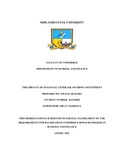Please use this identifier to cite or link to this item:
https://cris.library.msu.ac.zw//handle/11408/2217| Title: | The impacts of financial leverage on firms’ investment. | Authors: | Mukaro, Ewald | Keywords: | Financial leverage. | Issue Date: | Nov-2015 | Publisher: | Midlands State University | Abstract: | In this research a theoretical and an empirical framework that helps to analyze the impacts of financial leverage on firms with Zimbabwean firms under spotlight. Economists continue to debate the wisdom of adjusting capital structuresto certain specific optimal capital needed to influence investment decisions. Experts on the subject have marshaled theoretical and practical arguments, but did not reach a consensus leaving way for further study on the subject matter however this research has managed to evaluate on the subject in question looking in areas covering the effects of debt in the capital thus, giving suggestions on the way forward for firms in constructing a sustainable and sound financial stability to finance investment projects. The issue of agency participation in firms in the context of assumed roles by managers, can result in reduced investments and venture. In principle, the adverse effects of debt among firms vary according to the growth status and the components of the business capital structure. Firms with different growth levels have different impact of leverage on investments. Literature showed that leverage has a significant effect on firms performances and operations and such differ according to industry structures. The study adopted a model from Aivizian et al 2005 who studied Canadian firms on the impacts of leverage on investments patterns. From the sample, 25 firms were selected according to their price to earnings ratios with 135 observations for a period of 2010 to 2014. On firms with high growth, the impact is different from low growth firms. For capital structure, it is a managerial perspective which requires thorough analysis for them to choose the optimal level of capital balancing between leverage and equity. Financial risk may arise as a result of too much debt as internal rate of return won’t be able to cover interests and principal amounts to service the obligation. This has an effect on firms price of stock on the ZSE which influence investors attitudes henceforth firms’ investment patterns. | URI: | http://hdl.handle.net/11408/2217 |
| Appears in Collections: | Bachelor Of Commerce Banking And Finance Honours Degree |
Files in This Item:
| File | Description | Size | Format | |
|---|---|---|---|---|
| EWALD MUKARO.pdf | Full text | 1.04 MB | Adobe PDF |  View/Open |
Page view(s)
200
checked on Feb 26, 2025
Download(s)
160
checked on Feb 26, 2025
Google ScholarTM
Check
Items in MSUIR are protected by copyright, with all rights reserved, unless otherwise indicated.


